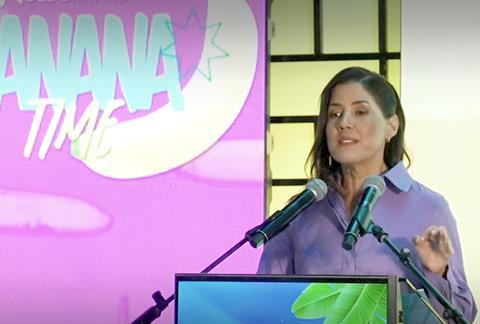Representatives from Ecuador’s biggest banana market visit farm in Guayaquil as part of Banana Time convention

A European delegation visited an organic banana farm in Ecuador last week to learn about the efforts the country is making to comply with rigorous European regulations on sustainability, quality, environment and due diligence.
The visit took part under the auspices of Banana Time, the largest international convention of the banana industry, which is held annually in Guayaquil.
The EU was the biggest market for Ecuadorean bananas in 2023, accounting for almost 30 per cent of the country’s US$3.5bn of exports. According to the Banana Exporters Association of Ecuador (Aebe), two of the three countries with the highest per capita consumption in the world are European – Germany in first place with 16.17kg and Italy in third place with 13.16kg. The US is second with per capita consumption of 13.9kg.
The European delegation, headed by the EU’s ambassador in Ecuador, Jekaterina Doródnova, met with the Banana and Plantain Cluster of Ecuador and later toured the Celia María Estate, located in the southern coastal province of El Oro, which belongs to Aebe’s new president Jorge Encalada.
Union leaders had a chance to demonstrate first hand their commitment to EU policies towards sustainable development. They also expressed their concerns about the growing certification and traceability demands imposed on them the EU’s Due Diligence Law and other regulations.
Once again, they highlighted that a number of European supermarkets are still using bananas as loss leaders to attract customers to their stores, something that the Cluster’s coordinator, José Antonio Hidalgo, said gives consumers the mistaken perception that the fruit is of low quality and that its producers are not paid a fair wage.
“We are making an effort to adapt to all their regulations, but they have to make an effort to communicate to the consumer what we are doing, and of the true cost of sustainability,” Hidalgo said.
“One cannot be inconsistent and say that you have to comply with new requirements or certifications but that I have to pay you less. Ecuador is ready to increase its volume for the EU, in compliance with the regulations of the Green Pact and the Farm To Fork strategy. But supermarkets must compensate all banana producers with fair prices.”
Following her visit to the farm, Doródnova told EFE that she was “very impressed” with what she had seen. She praised the cleanliness of the farm, along with the presence of “many women working, that generates employment and provides them with a decent salary”.
The ambassador explained that the aim of the new Due Diligence laws is to ensure that product entering the European market has not been grown using child labour, and respects the rights of workers as set out by EU and International Labour Organisation standards.
The new European regulations and their impact on the market were one of the topics being discussed at Banana Time Guayaquil, which brought together the main players in the banana industry in Ecuador and other Latin American countries at the end of October.



